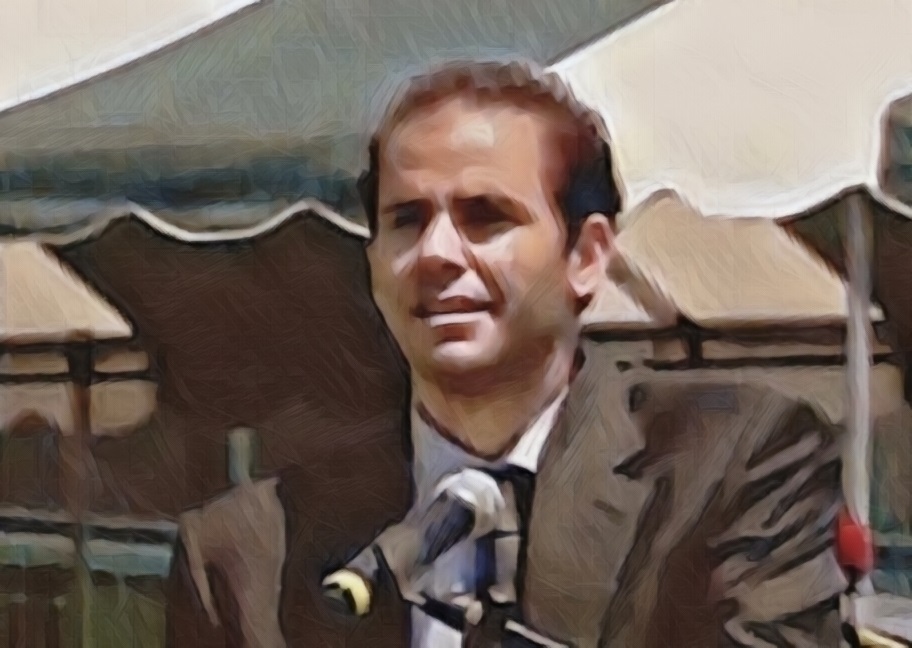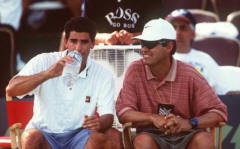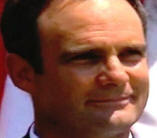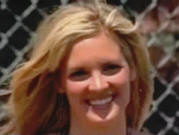[AUTHENTICITY CERTIFIED: Text version below transcribed directly from audio]
Thanks, Paulie. Iíll never forget that loss in í89. Its -- It still keeps me up, you know, today -- today. But -- Good afternoon, everyone. I want to -- Iíd like to thank you all for being here today to celebrate this day. Itís truly an honor to be officially inducted into the Hall of Fame. Iíd also like to congratulate my fellow inductees as well for taking a timeless place in the history of tennis, which is really special.
I must say Iíve always loved the history of the game as much as the game itself. I donít know how or why I picked up a tennis racquet at seven, but I did and it felt natural. My -- My dad -- Iíd rather be playing tennis right now so -- but my dad, he -- he recognized my talent and he got me into lessons and thatís where my love affair with the sport began. I remember as a kid hitting -- hitting balls in our basement. I used to hit at the local park and -- and as I got older I saw old tapes of Rod Laver and Ken Rosewall. Now at the time I was just fascinated by these guys and -- and how they played their attacking games.
But it wouldnít be until later that I would truly appreciate what it takes to be a great champion. Things like the importance of humility and class, sportsmanship and...dignity, And fortunately -- thanks -- fortunately for me, all these things tapped into my core values and how I was raised. Therefore, I embraced the tradition of the game from the start. In fact, there were times I would think Iím kind of a fifties player living in the nineties. And as a result I felt a bit misunderstood by some; but by many I felt embraced and loved. So, to my fans I -- I want to thank you. Your support and mutual respect we have for this great game has always meant a lot to me.
I come from a very strong and close family. My parents, Sam and Georgia, and my three siblings Gus, Stella, and Marion. My, excuse me, my family had no tradition in tennis. Yet from the get-go my dad gave me every opportunity to play. He did -- did everything in his power to enable me to, you know, to really play this -- this game of mine. I remember as a kid, my dad taking Stella and I to junior tournaments. And as I got older, my mom used to come on the court and -- and hit me balls, so I could hit them and -- she didnít know what she was doing, but -- but she was great. So they were both involved in my -- my junior game, but they never meddled when it came time for coaches or strategy or strokes.

They were more concerned with me playing well and winning -- you know, than winning. For example when I was fourteen, I had a two-handed backhand. I switched to a one-handed backhand and they -- they encouraged this process. Most people thought I was actually crazy for doing it and I had moments where I thought maybe it was -- it was the wrong thing to do. But it was this big picture thinking like this that would go on to, you know, really define my career. So my dad, he was the provider, my mom the nurturer. Having said that, thereís a toughness my mom swore that few have seen. You know it's -- I believe -- I believe thatís where I got my determination and my competitiveness and my drive from my mom. Those are virtues I inherited from somewhere deep under my momís softness.
As for my siblings, throughout my entire life Iíve always felt their support and never once did I feel any jealousy or animosity from any of them, which to me says a lot about our family. They kept -- They kept my -- my life balanced. They kept my life real, and now that we all share a new found role as parents, we continue to grow, and grow closer and closer, and I admire them with a lot of respect. So to Gus, Stella, and Marion and to my parents, thank you for supporting me and -- Itís harder than I thought -- for supporting me, for -- for giving me advice, and reminding me to always have faith. I love you guys and this momentís a celebration of all you as much at -- as it is for me.

Our highly productive and wonderful relationship was cut tragically short when Tim was diagnosed with cancer and in early í95 he was no longer able to travel with me. In one of his last appearances, he -- he attended a Davis Cup tie in Las Vegas.
(Okay, here we go.)
Then, after our victory, the team was packed with the usual people and there was a lot going on, but at one point I glanced over at Tim and our eyes briefly met, and we had a moment like there was no one else in the room. We were both thinking, we ought to be here alone together, you know, to savor this. And in a way I guess we were. That expression in Timís eyes remains with me to this day. I was with him, and he with me, to the end. I miss him to this day and I know itís a loss I share with the entire tennis world.
During the time when Tim was no longer able to travel with me, Paul Annacone quietly became the key silent partner on our team. And after Tim passed, Paul -- Paul became my coach. Even though he beat me in í89, he -- I still hired him. It was clear to me that Paul knew what I was all about. In fact, Paul would get to know me better than anyone else as a tennis player. We had a very unique relationship -- one that I think is very rare to find. Paul he knew how to keep, you know, really keep things simple and how to -- how to downplay things rather than ramp up an occasion. We really clicked that way.

In the late summer of í99, I had to pull out of the U.S. Open with a back injury. It was the best injury of my life because thatís where I met my wife, Bridget. Weíve been married almost seven years. We have two great kids: Ryan and Christian. When I met Bridget, Bridget was involved in a very successful acting career. But she put everything aside to travel with me and support me. In the final two hardest years of my -- my career, she became my rock and my sounding board. I was struggling with issues that I had never faced before. But through it all, Bridget kept me together with her empathy and compassion, her selflessness and light. She had to live with me in a time when it couldnít have been fun. Yet her unwavering loyalty and faith in me kept me strong at a time when I was losing faith in myself.

But Bridget and I, weíve been through a lot together in a short amount of time, and Iím constantly reminded why I married Bridget. She is committed and loyal; sheís an amazing mother; and beyond that, she loves me in a way that Iíve never -- Iíve never known. And in through that, sheís opened me up in ways I never thought possible. Iím more comfortable and happier that she is by my side. And I laugh a lot more, but not today. She -- Sheís my rock and I hope that Iím hers. I just want to say, thank you for everything -- and I love you.
I guess I bottled up emotion for sixteen years and now youíre seeing it, huh?
But tennis has -- has represented a big part of my life. Itís -- Itís given me a lifetime of memories and lessons, all of which I will carry with me forever. At the end of the day, the thing Iím most proud of is -- is -- is I never strayed from -- from...my core values. From the attitudes and philosophy passed on to me from my parents, and men like Rod Laver, I embraced the quiet way, and I walked the best -- that the high road as best I could. Above all, I wanted to represent myself, my family, and the game in a way which we could all be proud of.
So as I take my place among the greatest players of all time here in the Hall of Fame, I stand before you both humbled and grateful.
Iím a tennis player: nothing more, and nothing less.
It's more than enough for me. It always has been.
I thank you.
Also in this database: Michael Chang -- International Tennis Hall of Fame Induction Address
Audio Note: This audio edited for continuity and pace. All original convent preserved. Edited moments occur during long gaps in verbal content, as Sampras was overcome by emotion.
Page Updated: 8/14/24
U.S. Copyright Status: Text and Audio = Uncertain. Images = Fair Use.
